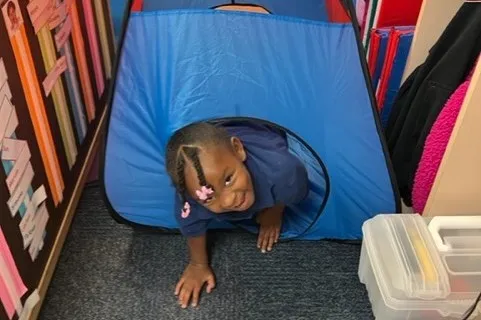Washington Educators Individualize Instruction With GOLD


State early childhood systems work best for children and families when they operate under unified leadership with an aligned vision for success. In recent years, we have seen many state leaders take action to organize early childhood systems to effectively deliver high-quality programs and services. Some states, such as Alabama and Colorado, have dedicated state agencies to early childhood. Others have consolidated existing programs and divisions into one agency or coordinated efforts across different agencies, as seen in Maryland and Texas, respectively.
The recent National Conference of State Legislatures’ (NCSL) Early Childhood Deep Dive Invitational highlighted Washington State’s system. Washington coordinates early childhood programs and services across the Office of Superintendent of Public Instruction (OSPI) and the Department of Children, Youth, and Families (DCYF). At the conference, a panel of leaders from each department discussed how the systems-level coordinated governance allows for early assessment data sharing and quality improvement across the birth through third-grade education continuum.
Washington has taken very intentional steps over the years to build an innovative and comprehensive early childhood system, with the work spanning two decades and changes in leadership, executive and legislative branches, and funding streams. Beginning in 1985, Washington supported children and families through the Early Childhood Education and Assistance Program (ECEAP), the state’s prekindergarten program aimed at preparing 3- and 4-year-old children for success in school and life. ECEAP provides child-centered, individualized preschool education and health coordination services on a strengths-based family support system, including providing services to increase social–emotional, physical, and pre-academic skills. As part of this work, ECEAP selected GOLD to assess the development and learning of participating children in 2012.
Over ten years ago, Teaching Strategies also partnered with what was then the Department of Early Learning and OSPI to create the Washington Kindergarten Inventory of Developing Skills (WaKIDS), a transition process that connects with key caregivers and supports young children from early learning to the kindergarten classroom. Components of the WaKIDS initiative include family engagement and connection; early learning collaboration (fostering relationships between early learning providers to support children’s transitions); professional development; and a whole-child formative assessment system, GOLD, that allows teachers to observe children while they’re engaged in everyday activities and authentically capture children’s demonstrated knowledge, skills, and abilities. To further support the state’s intentional connections across the birth-5 system, the tool was informed by early learning requirements already in place within both the state pre-k and Head Start programs. Furthermore, Teaching Strategies and Washington partnered to support the implementation of the WaKIDS Whole-child Assessment by incentivizing an inter-rater reliability training to aid in statewide adoption.
In 2023, the Washington state Legislature authorized Transition to Kindergarten (TK) as a voluntary program for 4-year-olds who need additional preparation to be successful in kindergarten and who lack access to other early learning group settings. All three components of WaKIDS must be administered at the beginning of the TK program, and the WaKIDS whole-child assessment must be administered at least one more time during the school year.
This developmental data then helps educators individualize instruction to best suit the needs of each child. With the creation of Early ECEAP (0-3) and requirements to assess children using GOLD in state funded 0–3 and 3–5 programming and as part of the kindergarten entry process, the state has created a seamless B–6 assessment system. Data collected in each of these programs has resulted in years of analysis of child outcomes for Washington’s state-funded PreK and, most recently, data collected from the WaKIDS formative assessment process reaffirmed a strong correlation between performance in third-grade English language arts (ELA), math, Smarter Balanced Assessments (SBA), and readiness at kindergarten.1 New reports continually reaffirm these outcomes. An analysis of WaKIDS data from Fall 2022 found that students who participated in TK outperformed their peers in all six learning domains.2 You can see more recent data from WaKIDS here.
Additionally, the WaKIDS- and ECEAP-required formative assessment system has unique relevance for Washington State leaders, as it provides a common data source to support decision-making across coordinated governance efforts. The data provide a statewide profile of children’s developmental readiness to inform community-, district-, and state-level decisions. ChildTrends, a leading early childhood research organization, emphasizes the importance of a common data system in promoting the well-being of children: “Early childhood integrated data systems (ECIDS) offer policymakers a comprehensive view of early learning investments and children’s and families’ experiences with different intervention services from birth.”3 The result provides a statewide profile of children’s success in state-funded PreK programming and developmental readiness for kindergarten, as well as a common language for state leaders to inform policy decisions.
Washington further supported this investment through legislation (RCW 43,41,400) establishing the Education Research and Data Center (ERDC), which houses the Preschool to Grade 20 to Workforce (P20W) data warehouse, a statewide longitudinal data system (SLDS) reporting information on Washington students spanning early learning, K-12, post-secondary, and workforce. The goal of ERDC is to coordinate with contributing state agencies and the community to fulfill data requests; conduct research; and, their biggest accomplishment, facilitate the creation of a data dashboard, such as this Early Learning Feedback Statewide Report dashboard, which represents the culmination of the efforts made by state-funded ECEAP teachers’ and kindergarten teachers’ assessments to build upon earlier assessments.
Since implementing GOLD as the WaKIDS formative assessment system, leaders and their state agencies have been pleased to see the data used to collaborate with partners and coordinate the state’s efforts to better serve Washington’s children and families.

Drive differentiated, effective instruction with GOLD.
Inform instruction by embedding authentic, observation-based assessment into each part of your day.
Additional highlights to Washington’s innovative approach to early childhood include the following.
- 2005: formation of the Washington Early Learning Council
- 2006: creation of the Department of Early Learning
- 2010: release of the 10-year strategic Washington State Early Learning Plan
- 2011: Washington receives federal Race to the Top grant award
- 2017: through recommendation of the Governor’s appointed Blue Ribbon Commission, creation of the new agency Department of Children Youth and Family (DCYF)
- 2018: Washington receives federal Preschool Development Grant award
– DCYF purposefully included OSPI programming in this grant. One example includes the agency’s transition work. - These efforts were further complemented in 2020 through the Governor’s directive to identify near-term administrative efficiencies and longer-term strategies to improve alignment and integration of high-quality early learning programs administered across state agencies and in 2021 through additional funding appropriated through the state legislature.
Through these steps, the Washington DCYF ECEAP and Washington’s OSPI partner with each other and other state agencies to carry out the state’s shared work for children and families. Examples of this cross-agency collaboration include the Washington Kindergarten Inventory of Developing Skills and more recent partnerships around the state’s transitional kindergarten.
References
1. Keller, K. (2022). Kindergarten readiness and 3rd grade outcomes: A predictive analysis using 2015–16 WaKIDS and 2018–19 3rd grade SBA data. Washington Office of Superintendent of Public Instruction. Retrieved from https://www.k12.wa.us/sites/default/files/public/earlylearning/pubdocs/Kindergarten-Readiness-and-3rd-Grade-Outcomes.pdf
2. Washington Office of Superintendent of Public Instruction. (2023). New data show transitional kindergarten programs close opportunity gaps. Retrieved from https://content.govdelivery.com/accounts/WAOSPI/bulletins/3465923
3. King, C. (2022). Integrated early childhood data is an essential tool for advancing racial and ethnic equity. ChildTrends. Retrieved from https://www.childtrends.org/publications/integrated-early-childhood-data-is-an-essential-tool-for-advancing-racial-and-ethnic-equity


